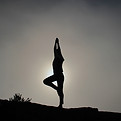

the path of
YOGA
THE YOGA PATH
Origin
Yoga originated thousands of years ago. The word 'Yoga' is originally derived from the Sanskrit root 'Yuj', meaning 'to join' or 'to unite'. The practice of Yoga is to create the union of individual consciousness with that of Universal Consciousness, creating a balance and perfect harmony between the mind, body and spirit.
The practice of the yoga path in the West is referred to as 'Hatha yoga'. This is the art of creating spiritual union by the use of postures and movement of the body to balance the body's energies.
Yoga harmonises the mind, body, and spirit, much like climbers align their physical and mental faculties for a successful ascent. Rooted in ancient Indian philosophy, yoga encompasses a wide range of physical postures, breath control, meditation, and ethical principles. At its core, yoga seeks to achieve unity and balance within oneself and with the universe.
Asana
The physical aspect of yoga, known as "asana," involves a series of postures and stretches that enhance flexibility, strength, and balance. These postures are often sequenced with controlled breathing techniques, known as "pranayama," which not only enhance lung capacity but also calm the mind.
Yoga goes beyond the physical realm. It delves into the inner world through meditation and mindfulness practices, fostering self-awareness and mental clarity. The ethical and moral principles of yoga, such as non-violence (ahimsa) and truthfulness (satya), guide practitioners towards ethical living and harmonious relationships with others.
Well-Being
The benefits of the yoga path are profound, spanning from reduced stress and improved mental health to enhanced physical fitness and greater self-acceptance. Yoga is a versatile practice, offering various styles to cater to different needs, from gentle, restorative practices to more vigorous, strength-building forms.
Ultimately, yoga is a journey of self-discovery and self-improvement, providing a path towards physical vitality, mental serenity, and spiritual awakening, much like climbers ascend towards higher peaks, seeking not only the summit but also the transformation and enlightenment that come with the ascent.

Yoga was originally practiced as a form of healing.
WHY WALK THE YOGA PATH
Body
The yoga path has many benefits for the mind, body and spirit. Simultaneously creating flexibility and strength in the body whilst creating a balanced, present mind and connecting you to spirit. Scientific research into yoga’s benefits is in its early stages but has shown so far that Yoga is incredibly beneficial to our overall health and well-being.
Mind
Most people take up yoga for its benefits on the body of an increase in flexibility, mobility and strength. However, benefits on the mind are equally valuable. Pushing the body through postures and sequences forces the mind to remain present and the breath becomes a primary focus. Stepping outside of the thinking mind is incredibly important for mental health and can relieve symptoms of depression and anxiety.
The yoga path is a transformative practice that offers a multitude of benefits, making it a valuable and enriching pursuit for individuals seeking self-improvement and holistic well-being. Here's why you should consider practising yoga:
Physical Health
Yoga enhances flexibility, strength, and balance. Regular practice can lead to improved posture, reduced risk of injury, and better overall physical fitness.
Stress Reduction
Yoga incorporates mindful breathing and meditation, promoting relaxation and reducing stress levels. It helps calm the mind, reduce anxiety, and improve mental clarity.
Mental Well-being
Yoga fosters mental resilience and emotional stability. It can alleviate symptoms of depression and anxiety and enhance overall psychological well-being.
Improved Focus
Yoga's emphasis on concentration and mindfulness sharpens cognitive abilities. This heightened focus can improve decision-making and problem-solving skills.
Mind-Body Connection
Yoga encourages a strong mind-body connection, promoting self-awareness and a deeper understanding of your physical and emotional needs.
Better Sleep
Regular practice can lead to improved sleep patterns and quality, aiding in restorative rest and enhancing overall sleep health.
Enhanced Self-Acceptance
Yoga encourages self-acceptance and self-compassion. It promotes a positive relationship with your body and mind.
Increased Energy
Yoga practices, such as pranayama (breathing exercises), can boost energy levels, helping you feel more vital and productive.
Community and Support
Joining a yoga class provides a sense of community and support, fostering social connections that contribute to emotional well-being.
Spiritual Growth
For those interested in spiritual exploration, yoga offers a path towards self-discovery and enlightenment, helping you connect with your inner self and the broader universe.
Ultimately, the yoga path is a versatile and adaptable practice that can be tailored to meet your specific needs and goals. Whether you're looking to enhance physical fitness, reduce stress, improve mental clarity, or embark on a spiritual journey, yoga is a powerful tool for self-improvement and holistic well-being.

In Sanskrit 'Ha' means sun and 'tha' means moon. The focus of Hatha yoga is to balance these two energies in the body.
HOW TO DO YOGA
Practising yoga is a rewarding journey towards self-improvement and will do wonders on your journey to the summit.
Choose Your Style
Begin by selecting a yoga style that suits your goals and fitness level. Hatha and Vinyasa are excellent for beginners.
Find a Suitable Space
Create a quiet, clean, and comfortable space for your practice. Use a yoga mat for support if available.
Wear Comfortable Clothing
Wear loose, stretchy clothing that allows for free movement and go barefoot.
Learn Basic Poses
Start with fundamental poses like Downward-Facing Dog, Child's Pose, and Mountain Pose. Pay attention to proper alignment and breath control.
Focus on Breath
Practice mindful breathing. Inhale deeply through your nose, fill your lungs, and exhale fully. Sync your breath with your movements.
Follow a Sequence
Utilise online tutorials or attend classes with experienced instructors to follow structured sequences.
Practice Regularly
Consistency is vital. Aim for a few yoga sessions per week to experience the full benefits.
Listen to Your Body
Respect your body's limits and never force poses that feel painful or uncomfortable.
End with Relaxation
Conclude your practice with a relaxation pose like Savasana to allow your body and mind to absorb the benefits.
Seek Guidance
Attend classes or workshops to deepen your practice or seek guidance when needed.
Remember, the yoga path is a journey of self-discovery and personal growth. By focusing on these core steps, you can begin your yoga practice with a solid foundation, much like climbers prepare for a challenging ascent with essential equipment and a clear path. As you continue, you'll gradually experience the physical and mental benefits that yoga offers.
BENEFITS

Yoga fosters a sense of balance, not only physically but also mentally and emotionally. It promotes emotional stability, self-acceptance, and a greater sense of well-being.

Yoga emphasises proper alignment and body awareness, which can lead to improved posture. This is essential for reducing strain on the spine and preventing musculoskeletal issues.

Yoga involves a wide range of poses and stretches that enhance flexibility, helping to increase your range of motion and reduce the risk of injury.

Many yoga poses require you to support your body weight, which can lead to improved muscle strength, particularly in the core, legs, and upper body.

Yoga incorporates mindful breathing and meditation, promoting relaxation and reducing stress levels. It helps calm the mind, reduce anxiety, and improve mental clarity.

Yoga practices encourage focus and mindfulness, which can enhance cognitive function, increase attention span, and improve decision-making skills.
Walks
"Fasted Flow" combines intermittent fasting with exercise or yoga, creating a lighter, more agile body. This path enhances focus and vitality, fostering a deeper connection between body and mind. "Grounded" combines grounding with yoga for harmony with mother earth.
Hikes
The "Union" and "Gaia" hikes offer journeys of deep self-connection. Union harmonises mind, body, and spirit with meditation, yoga, and prayer, fostering inner balance and well-being. Gaia reconnects participants with Earth through yoga, grounding, and nature immersion, enhancing environmental harmony and spiritual grounding.
Yoga is essentially a practice for the soul, working through the medium of the body.
Tara Fraser
Yoga adds years to your life and life to your years.
Alan Finger
Yoga is a practice of quieting your mind.
Patanjali




